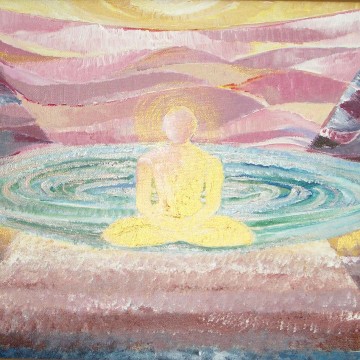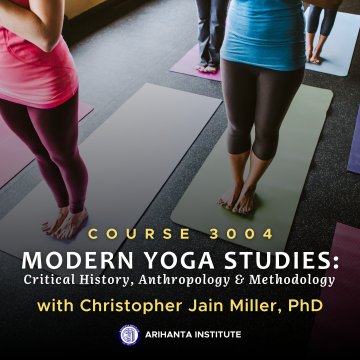Modern Yoga Studies: Critical History, Anthropology and Methodology
Course Intro Video


Modern Yoga Studies: Critical History, Anthropology and Methodology
Course 3004
One of the primary questions students of modern yoga seek to answer is precisely how the forms of contemporary yoga practiced today are connected to pre-modern forms of yoga developed in India. To begin to answer this question and to formulate new questions, this course will trace some of the historical continuities and discontinuities between pre-modern and modern yoga practices, demonstrating that modern yoga is a complicated, transnational cultural product. We will explore the legacy of the first yoga teachers who brought yoga to America and Europe as well as yoga’s development from a historical, social, and political perspective.
Students will thus take into account current scholarly debates regarding the relationship of transnational yoga to categories such as capitalism, neoliberalism, orientalism, racism, speciesism, gender, cultural appropriation, biopolitics, nationalism, and colonization. Doing so will encourage yoga practitioners to adopt new methodologies concerning the critical study of modern yoga, and will also give them an opportunity to confront and unravel saṃskāras, or acquired mental impressions and social conditionings, related to their inherited beliefs regarding the origins, history, and contemporary practice of yoga. The course is thus simultaneously intellectual as well as, from a yogic perspective, transformational.
Students will thus take into account current scholarly debates regarding the relationship of transnational yoga to categories such as capitalism, neoliberalism, orientalism, racism, speciesism, gender, cultural appropriation, biopolitics, nationalism, and colonization. Doing so will encourage yoga practitioners to adopt new methodologies concerning the critical study of modern yoga, and will also give them an opportunity to confront and unravel saṃskāras, or acquired mental impressions and social conditionings, related to their inherited beliefs regarding the origins, history, and contemporary practice of yoga. The course is thus simultaneously intellectual as well as, from a yogic perspective, transformational.
Course Length
20 hoursCourse Details
• 20-hour self-study course.• Additional readings offered as support material.
• Professor available by appointment.
Learning Area
 Yoga, Self-care and Spirituality
Yoga, Self-care and Spirituality Instructor
 Christopher Miller, PhD
Christopher Miller, PhD
Christopher Jain Miller, the co-founder and Vice President of Academic Affairs at Arihanta Institute, completed his PhD in the Study of Religion at the University of California, Davis. He is Professor of Jain and Yoga Studies at Arihanta Institute, Visiting Researcher at the University of Zürich's Asien-Orient-Institut, and Adjunct Professor at Claremont School of Theology. Christopher's primary fields of research interest are Yoga Studies and Engaged Jain Studies, and he currently serves as the co-chair of the Yoga in Theory and Practice Unit at the American Academy of Religion as well as on the steering committees for the Dharma Academy of North America (DANAM) and the Yoga Darśana Yoga Sādhana conference. Christopher is the author of Embodying Transnational Yoga: Eating, Singing, and Breathing in Transformation (Routledge 2024) and the co-editor of Engaged Jainism: Critical and Constructive Studies of Jain Social Engagement (SUNY 2025) as well as Beacons of Dharma: Spiritual Exemplars for the Modern Age (Lexington 2020).
Enrollment Options
14-DAY FREE TRIAL
- Free, unlimited access to our self-paced courses for 14-days.
- Already used your free trial? Enroll in our Monthly or Annual Membership options at anytime and continue learning immediately!
MONTHLY MEMBERSHIP
- $45 USD / Month
-
Immediate access to course
#### | Name. - Unlimited access to our live and self-paced courses for one month, with month-to-month auto rollover.
- Excludes graduate seminars, language courses, and courses hosted on partner platforms.

